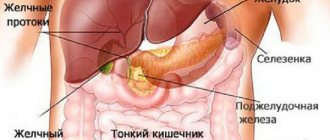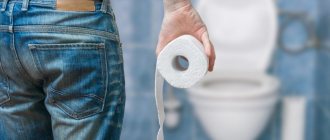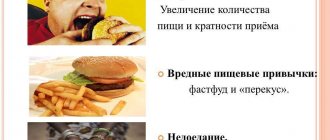The process of digesting food begins in the mouth, where it is chewed for easier passage through the esophagus (connecting the stomach and oral cavity).
In the stomach, food and liquids mix with digestive juices. The enzymes it contains help break down food, and the hydrochloric acid neutralizes some potentially harmful bacteria. From the stomach, chyme (a liquid mixture of partially digested food) slowly moves into the intestines, which takes several hours. The main part of digestion begins - most of the nutrients are absorbed in the small intestine. Then, through millions of tiny villi that form the walls of the intestine, these substances enter the blood. And what remains goes into the large intestine, where water is absorbed and feces are formed.
Is it necessary to go to the toilet every day?
It is not necessary to go to the toilet every day. Everything here is individual, the main thing is regularity. It is considered normal to have bowel movements at least three times a week and no more than three times a day. Moreover, even small changes in lifestyle can affect the frequency of trips to the toilet. For example, a person began to wake up earlier or later, drink more or less water, exercise more often or less often, drink coffee in the morning, or eat food that is unusual for him. During menstruation, women may experience problems such as constipation and diarrhea due to changes in hormones. Constipation is associated with an increase in the hormone progesterone during the premenstrual period - through it, food moves more slowly through the intestines. And prostaglandins are responsible for diarrhea - active substances that promote contraction of the muscles of the uterus. When their content becomes high, they enter the intestines and cause it to contract.
Causes of rumbling in the stomach
Rumbling sounds are the result of fast or slow movement of liquid, gases, food through the digestive tract. From time to time, rumbling is disturbing due to overeating or when a person is hungry.
Rumbling in the stomach can be provoked by the consumption of gas-forming products, smoking, the habit of eating on the run, talking or watching TV while eating, and constantly chewing gum. Seething is alarming after drinking carbonated and alcoholic drinks in large quantities, against the backdrop of strict diets.
After a heavy dinner, strong rumbling bothers you at night or in the morning, accompanied by a feeling of heaviness, pain in the left or right side, heartburn or severe belching. Rumbling also occurs on an empty stomach, since the intestinal muscles are constantly contracting - if the stomach is empty, air and hydrochloric acid react, which causes unpleasant noises to appear.
Frequent loud noises in the stomach indicate a disturbed course of processes and the presence of pathogenic factors, especially if they are accompanied by other unpleasant manifestations.
What pathologies cause stomach turmoil?
Loud gurgling, rumbling and growling in the stomach is a sign of a disruption in the absorption of nutrients at any stage of food digestion. Pathologies are accompanied by the development of putrefactive processes, increased gas formation, pain in different parts of the abdomen, feces and gases acquire an unpleasant odor, and particles of undigested food, mucus, and blood are present in the feces.
Main diseases:
- The initial stage of gastritis
- rumbling in the stomach begins a few hours after eating, accompanied by bloating and attacks of nausea. - Pathologies of the liver, pancreas
- pancreatitis, hepatitis, rumbling intensifies when a person lies down, is accompanied by discomfort in the right side in the liver area, the person is often very swollen and nauseous. Diseases more often develop in men due to abuse of alcohol and junk food. - Acute chronic diseases of the upper gastrointestinal tract
- duodenitis, cholecystitis - provoke the development of enzyme deficiency, a lot of undigested food accumulates in the intestines, and the process of rotting and fermentation begins. - Irritable bowel syndrome, vegetative-vascular dystonia, and other nervous diseases
- with such pathologies, intestinal motility is disrupted and problems arise with the absorption of food. Additional symptoms are flatulence, constipation or loose stools, frequent bouts of nausea. - Dysbacteriosis
- develops with long-term use of antibacterial drugs, is accompanied by upset stool, pain and cramps in the abdomen, and periodic nausea. - Food allergies
– most often negative immune reactions – are the body’s response to eating foods containing lactose and gluten. - Food intolerance
- develops against the background of damage to the organs of the biliary system, with a decrease in the level of enzymes. Most often, with age, the body ceases to accept legumes, mushrooms, milk, strawberries, and butter. - Helminthic infestations
- most parasites affect the organs of the digestive system, disrupting the functions of the gastrointestinal tract. - Poisoning by poor quality food
, toxins and chemicals. - The presence of adhesions, polyps, neoplasms of various types
, foreign objects in the gastrointestinal tract, congenital anomalies. - Inflammatory infectious pathologies
– dysentery, salmonellosis. Seething is accompanied by severe diarrhea, vomiting, high fever, and weakness.
In women, grumbling, diarrhea, pain and cramps develop against the background of hormonal changes before menstruation, during pregnancy, breastfeeding, and menopause.
Rumbling and severe flatulence often occur after operations on the abdominal organs, as intestinal motility slows down. Food moves slowly, begins to ferment, gases accumulate in the stomach, stretch its walls, and unpleasant sensations appear.
Often loud sounds in the stomach are a consequence of negative mental or physical factors.
Causes of rumbling stomach in a child
Seething in the stomach in infants is a typical phenomenon, even if you feed the baby correctly. The reasons are imperfect functioning of the digestive system, low levels of enzymes, and swallowing a large amount of air during feeding.
In older children, gurgling, pain in the lower abdomen or around the navel most often occurs when infected with parasites; discomfort may indicate the development of diseases of the gastrointestinal tract. Rumbling in adolescents is a consequence of poor nutrition, diets, and addiction to fast food and carbonated drinks.
The number of children and adolescents with gastritis is rapidly increasing every year.
What causes constipation and diarrhea?
The causes of constipation and diarrhea can be very different; only a doctor can determine the exact cause. Constipation often occurs as a result of a certain lifestyle, for example, when a person moves little, does not eat foods rich in fiber, drinks little water, or does not have bowel movements for a long time when he needs to go to the toilet. In this case, doctors recommend eating more fiber (about 20-35 grams per day) and not putting off going to the toilet (the intestines are most active in the morning and after meals). Diarrhea can be caused by viruses and bacteria that live in water or food. Diarrhea not associated with infection may occur as a side effect of taking antibiotics or other drugs, as a result of food allergies, or gastrointestinal conditions such as inflammatory bowel disease.
If diarrhea or constipation occurs periodically for three months in a row and is accompanied by abdominal pain and bloating, then this is a reason to suspect irritable bowel syndrome. Symptoms of this disorder make themselves felt at least once a week, and test results do not reveal the presence of any pathological condition in the body. However, there are a lot of diseases that are characterized by diarrhea or constipation, so it is important to carefully study and take into account other unpleasant symptoms. You should contact your doctor if:
- sudden weight loss;
- frequent diarrhea;
- the appearance of blood on toilet paper;
- vomiting;
- difficulty swallowing;
- constant intense pain that does not subside and requires painkillers.
If you have these symptoms, it is better not to postpone a visit to the doctor. The same applies to cases where symptoms appeared after 50 years or relatives were diagnosed with colon cancer.
What to do if your stomach growls?
To stop the rumbling, they use medicines and folk remedies, and be sure to prescribe a diet.
Eating for stomach turmoil
Prescribing your own diet is not only ineffective but also dangerous, but you can develop good eating habits that will help you avoid stomach discomfort.
Nutrition rules:
- Follow the regime, eat 4-6 times a day, have dinner 2-3 hours before bedtime, do not overeat.
- Eat slowly, chew your food well, and do not be distracted by conversations or other activities while eating.
- Drink at least 8 glasses of water a day, and keep the number of caffeinated drinks to a minimum.
- Avoid eating fatty foods and sweets.
- If you do not have allergies or intolerance to milk sugar, include cottage cheese, natural yogurt, kefir in your daily diet, and choose products of medium fat content.
Products that provoke increased gas formation are all types of legumes, vegetables and cabbage, mushrooms, root vegetables, yeast baked goods, whole milk, avocados, bananas.
Treatment with drugs
Properly selected drug therapy can eliminate abdominal discomfort and the causes of its occurrence.
The stomach makes strange sounds - how to treat:
- probiotics – Acipol, Hilak forte, restore the balance of intestinal microflora in case of dysbacteriosis;
- nitrofurans – Furazolidone, Nifuroxazide, eliminate intestinal infectious pathologies;
- The carminative drug – Espumisan, after taking the tablets the gas bubbles burst, flatulence and rumbling go away, the medicine can be taken during pregnancy, the drug in the form of a suspension is safe for infants;
- enzymes - Creon, Orlix, improve the process of digestion and breakdown of complex substances;
- drugs to improve motor skills - Motilium, Motilak.
The most popular remedy for eliminating rumbling is activated carbon and other enterosorbents. These drugs eliminate all harmful substances in the stomach, but they must be taken separately from other drugs because they absorb everything that is in the stomach and intestines.
How to get rid of the problem using folk remedies?
Alternative medicine eliminates disturbances in the functioning of the gastrointestinal tract; rumbling and discomfort will bother you much less frequently.
Seething in the stomach - traditional methods of treatment:
- Brew 1 tsp. dry crushed chamomile inflorescences 270 ml of boiling water, leave in a closed container for half an hour, filter. Take 120 ml three times a day after meals. The drink eliminates inflammatory processes, flatulence, bloating, and normalizes peristalsis.
- Pour in 1 tsp. dill seeds 220 ml of boiling water, leave in a sealed container for 2 hours, filter. Drink the entire infusion in small portions throughout the day. This remedy quickly eliminates increased gas formation.
- For severe flatulence, add 1 tsp. chopped parsley root 220 ml of cold water, after 20 minutes heat, but do not bring to a boil, strain. Drink the drink in small portions throughout the day.
- Peppermint tea eliminates nausea, pain and abdominal cramps, and has a mild anti-inflammatory and sedative effect. Pour 220 ml of boiling water over 5-10 fresh or dried leaves, strain after 10 minutes. Drink a drink instead of tea.
- Brew 1 tbsp. l. crushed wormwood 500 ml boiling water, leave for 24 hours, strain. Drink 35-45 ml in the morning before breakfast, you can add a little honey to improve the taste.
To avoid problems with peristalsis, exercise regularly and do exercises to strengthen your muscles. Swimming has a good effect on the functioning of the digestive system.
How can you tell if your stomach hurts due to intestinal problems?
Problems with the intestines may be indicated by non-localized pain (when the stomach hurts, but the person cannot say exactly in which place), pain in the lower abdomen and cramping pain in this area. In any case, only a doctor can accurately determine that the problem is in the intestines. With a high probability, the cause of the problems will be a functional intestinal disorder. However, it is first necessary to exclude more serious pathologies - the doctor will ask the patient in detail about the symptoms, prescribe a blood and stool test, and, if necessary, a colonoscopy. Further actions depend on the results of the study.
If all the results are negative, then the cause of the pain is most likely the same irritable bowel syndrome (IBS). Typically, treatment of the disease begins with an analysis of the symptoms. If you eliminate the factor that provokes the attack, you can avoid recurrence of the problem. For short exacerbations, medications that relieve the symptoms themselves are suitable. So, due to a spasm, a person sometimes cannot go to the toilet, and with IBS, spasms cause pain and bloating. In this case, antispasmodics are used as an ambulance.
Sometimes during treatment, your doctor may prescribe antidepressants. With irritable bowel syndrome, such drugs help cope with pain and slow down bowel function, and are good for diarrhea. Scientists have also established a connection between increased anxiety and IBS symptoms, so your doctor may recommend visiting a psychotherapist.
Diagnostics
For a complete examination of the hepatobiliary system, the following is required:
- biochemical blood test to determine the level of transaminases, bilirubin, protein, alkaline phosphatase;
- Analysis of urine;
- Cazzoni allergy test;
- immunological tests to detect antibodies to echinococcus;
- coagulogram, the results of which evaluate the functioning of the coagulation system;
- clinical blood test to determine the level of eosinophils;
- electrocardiography, ultrasound of the heart, chest radiography, coronary angiography - to exclude/confirm cardiac and pulmonary pathology;
- ultrasound diagnostics of the liver;
- liver biopsy;
- laparocentesis;
- cholegraphy;
- duodenal intubation, during which a violation of bladder motility is detected, bile is collected for analysis. Based on the results of bile culture, it is possible to select effective antibiotic therapy;
Is it hemorrhoids when it hurts to go to the toilet?
Here you also need to take into account other symptoms (if any) and how often pain occurs during bowel movements. If pain occurs every time you go to the toilet, and there are traces of blood on the toilet paper, you should consult a doctor. Most likely it is hemorrhoids or anal fissure. Most often, such conditions arise as a result of constipation, when you have to strain very hard during bowel movements, and the stool is too hard.
However, blood can be a sign of other serious pathologies, such as duodenal ulcers or Crohn's disease. However, there is no need to panic: a little red blood one time without other symptoms does not mean you need medical attention. This really happens. But if the bleeding persists for several days (or periodically goes away, but then returns again) and there are symptoms such as difficulty breathing, abdominal and chest pain, dizziness, fatigue, fever, change in the color of the feces (for example, they turned black ), you should consult a doctor immediately.










